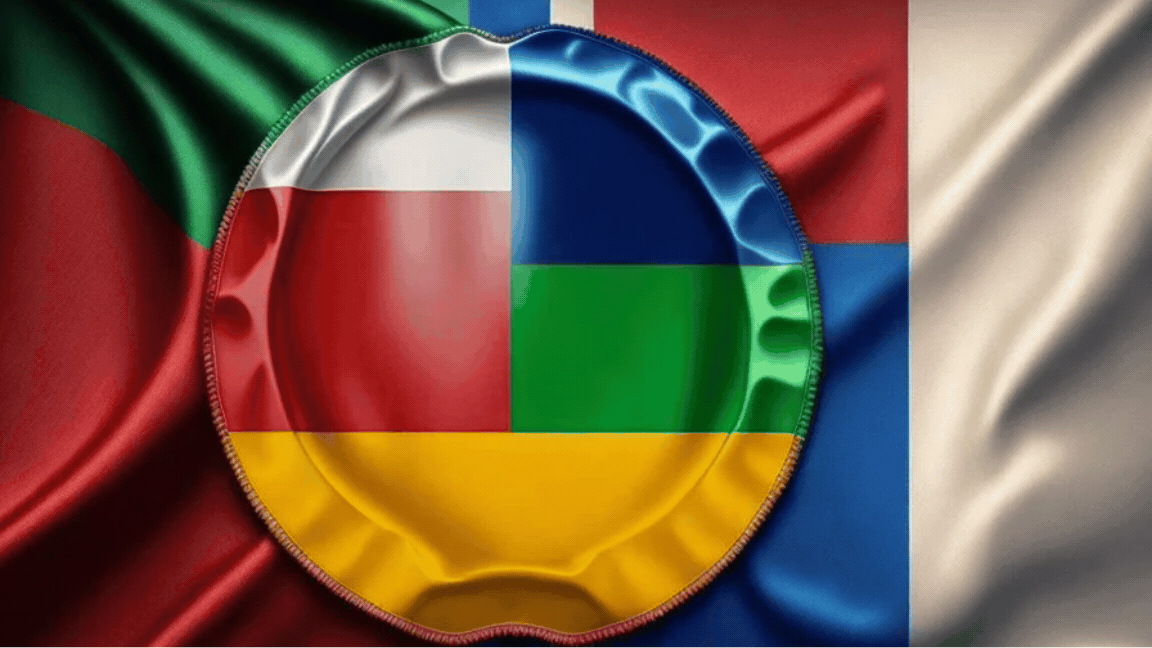
May 1 was an eventful day in Latin America. The usual protests demanding better working conditions were a channel to express solidarity with—and anger because of—the humanitarian crisis in Gaza. Most notorious in this regard was the announcement by Colombian President Gustavo Petro that he will break diplomatic relations with Israel as of this Thursday "for having a genocidal [Prime Minister]". From Jerusalem the Israeli foreign minister, in return, called him "a hate-filled anti-Semite".
Presidente Petro anuncia rompimiento de relaciones con Israel.
— Noticias Caracol (@NoticiasCaracol) May 1, 2024
Ampliación >> https://t.co/YmuFuEFOXx pic.twitter.com/Nt8SIyRrCm
But even within the United States, where certain student movements have demonstrated their courage and political awareness, citizens of Latin American origin have been at the forefront of social activism demanding an end to the shedding of more innocent Palestinian blood. "Israel is attacking the Palestinian people with our taxes and the U.S. government continues to give them billions of dollars for that war instead of investing in our needs such as housing, decent education, and better jobs", claimed Ron Góchez, son of a Salvadoran mother and Mexican father—an admirer of Che Guevara—who participated in the mobilizations in Los Angeles, California.
Uruguay
At a demonstration for International Workers' Day in the capital of Uruguay, the president of the country's main trade union organization referred to the "genocide of the State of Israel, led by the extreme right in collusion with U.S. imperialism." "It is not a war or a massacre, but a systematic genocide of the Palestinian people", he said in statements that were rejected by the Uruguayan chapter of the B'NAI B'RITH organization. "The State of Israel is exercising its right of defense against the constant attacks by the Hamas terrorist organization", the latter stated in a communiqué, justifying the thousands of deaths in the Gaza Strip with the alleged use of the Palestinian civilian population as human shields attributed to Hamas.
"Decimos fuerte y claro que condenamos el genocidio del Estado de Israel conducido por la extrema derecha !!!" dijo Marcelo Abdala sobre las muertes de palestinos en Gaza y reclamó un "alto al fuego ya!! y contra un ....GENOCIDIO sistemático contra el pueblo palestino!!" señaló pic.twitter.com/ofBo3aFSCz
— leo sarro press Uruguay (@leosarro) May 1, 2024
Back to May 1 original discussion points, the Uruguayan government defended that there has been an organic growth in employment, and that the purchasing power of wages in the most expensive country in South America has been "totally" recovered. However, there are opposing readings. In nearly 3.5 years of Lacalle Pou's conservative administration, there were only five months where the wage was above 2019 levels, although the disruptive effect of Covid-19 is an argument in its favor. The economy is certainly richer and more income is reported, but no ground has been gained in the battle against poverty (anyway, its levels are not as outrageous as in other countries in the region). "There is a significant percentage of working poor," says one female researcher.
The narrative of leftist sectors points to the fact that the policy of the current inhabitants of the Executive Tower favors the better-off economic sectors while weakening social safety nets. In this sense, the ascetic and respected former president José Mujica has proposed that—in a gesture more symbolic than practical—the next president donate 40% of his salary to fight poverty, although not seeing that battle from a welfare approach: it is about "bringing out new workers with dignity". True to his profile, Mujica has refused to receive treatment outside Uruguay for a tumor discovered in his esophagus.
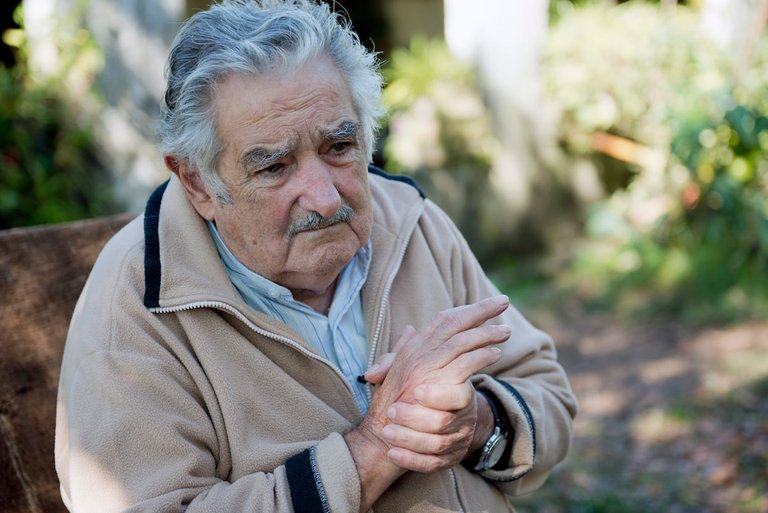 José Mujica (source)
José Mujica (source)Regional lens
In Argentina, the General Confederation of Labor was at the forefront of a large mobilization against the austerity and deregulation policies of President Javier Milei, who last Tuesday took an important—if still incomplete—step in the realization of his economic program. "All social, labor, union and professional rights are threatened", said the trade union organization in a communiqué. A nationwide strike is planned for May 9, in which they will continue to pressure the Senate to block Milei's flagship legislation—which among other things discriminates in favor of big foreign capital.
LIVE: May Day march in Argentina https://t.co/cu3ZhMfhUy
— Reuters (@Reuters) May 1, 2024
In São Paulo, Lula decreed income tax exemption for Brazilians earning US$ 545, promising to include soon those earning around US$ 960. In Mexico, AMLO launched a program that in the first stage amounts to 2,335 million dollars, benefiting "formal workers retired since 1997". In Venezuela, Maduro raised 30 dollars to an assistance program intentionally called "Economic War Bonus", in allusion to Washington's sanctions. Civil society sectors—not necessarily tied to the opposition—tried to protest against poor working conditions, demanding "decent salaries, not crumbs".
"Seguimos en pie de lucha. Ya que no tenemos un salario que nos permita recrearnos, lo hacemos en las protestas", educadora venezolana en la marcha de este #1May en Plaza Venezuela, Caracas.
— VPItv (@VPITV) May 1, 2024
Conéctate a #VPItv: https://t.co/GCQNKCi84c pic.twitter.com/8yepTBCCMz
In Peru, the demonstrations served to remember those who lost their lives during the protests that followed the chaotic departure from power of former president Pedro Castillo. Relatives and civil society in general united to demand "dignity and justice", given that impunity reigns in the nearly 50 cases of individuals killed at the hands of security forces more than a year ago. "With gold chains, you drag 60 deaths", read a sign against embattled President Dina Boluarte, alluding to her potential responsibility in how the protests were quelled and the recent plot being investigated by the Public Ministry for jewelry she used—allegedly borrowed—without declaring them as required. Informal workers in Perú represent more than 75% of the entire economically active population.
Daniel Noboa received a harsh rebuke from the working class in Quito, which reaffirmed its rejection of the economic proposals that the head of the Carondelet Palace attempted to advance—via referendum—along with new measures in the area of security. In Paraguay, people also mobilized massively. The South American nation is marked by high levels of labor informality, a context that implies that 1 out of every 3 workers ends up earning less than the minimum wage. In El Salvador, taking advantage of the homage to the Chicago martyrs as a backdrop, there were sectors that protested Nayib Bukele's security strategy.
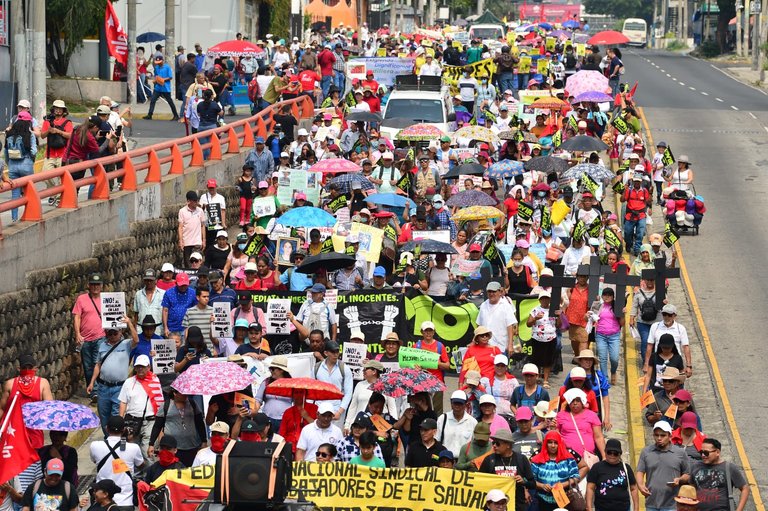 Popular march yesterday in San Salvador (source).
Popular march yesterday in San Salvador (source).In Chile, the main trade union organization continues to call for dialogue with President Gabriel Boric. "Today, many workers, despite having a job, do not have enough to make ends meet. For this reason, we want to propose that before the end of President Boric's term of office, a wage table be set up to allow us to dialogue with all the actors", said its president. The unions are asking the former student leader to raise the minimum wage by a little more than 30% to set it at around 630 dollars, although a recent law will bring it to 520 dollars by next July.
In addition, Chile already applies—also by law—a gradual reduction of the working day, which is reduced from 45 to 40 hours. "You don't live to work, you work to live", Boric defended. Incidentally, Mexico is another country where there is a strong push for this reduction of the working day to 40 hours, which until very recently only had Ecuador on the list (via Rafael Correa). In Honduras, where one-fifth of the population has employment problems, workers demanded—besides better jobs—better health and education services, and a also a drop in the cost of food.
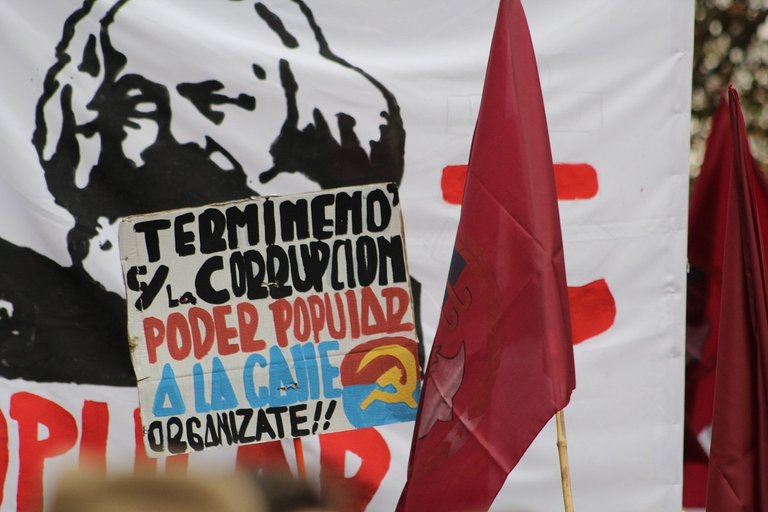 Posters and flags in the demonstrations yesterday in Chile (source).
Posters and flags in the demonstrations yesterday in Chile (source).Meanwhile, in San José, workers marched "[against] the neoliberal policies" attributed to President Rodrigo Chaves and "against the privatization and sale of public institutions". "We are in a serious situation of growing inequality, social exclusion, economic exclusion, with precarious or frozen salaries; a very serious attack on the health system and the threat of selling good public companies. There is a line of confrontation developing with this government", expressed a Costa Rican union leader.
Also there, compliance with the constitutional provisions regarding education financing was demanded. "We are demanding that the education budget be respected because this [year] we are aware that it is going down. Education is going at a very slow pace, almost to the abyss", said the leader of the union comprising educators.
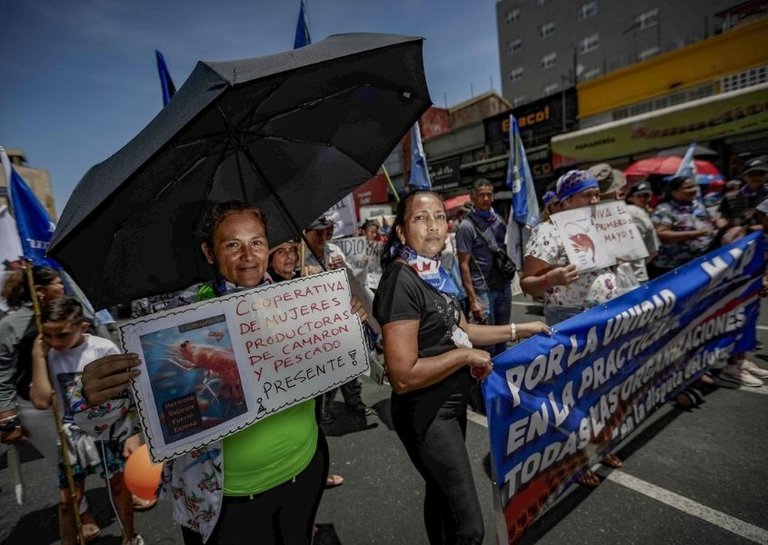 Demonstration in Costa Rica yesterday (source).
Demonstration in Costa Rica yesterday (source).In Bolivia, where the economic crisis is also being felt, President Luis Arce raised the minimum wage by about 6%, trying to cement his alliance with the unions. The measure would be limited by high levels of labor informality, a kind of scourge in the region as discussed. Finally, in Havana, the traditional march called by the Government was replaced by a concentration in the so-called José Martí Anti-imperialist Tribune.
Speakers here referred to the tense economic situation the island is experiencing, marked by sky-high inflation and shortages of almost everything, always placing most—if not all—of the responsibility on U.S. policy. In Cuba, for political-historical reasons impossible to address now in this space—but which I have dealt with in other posts—, there are no typical marches demanding better salaries.
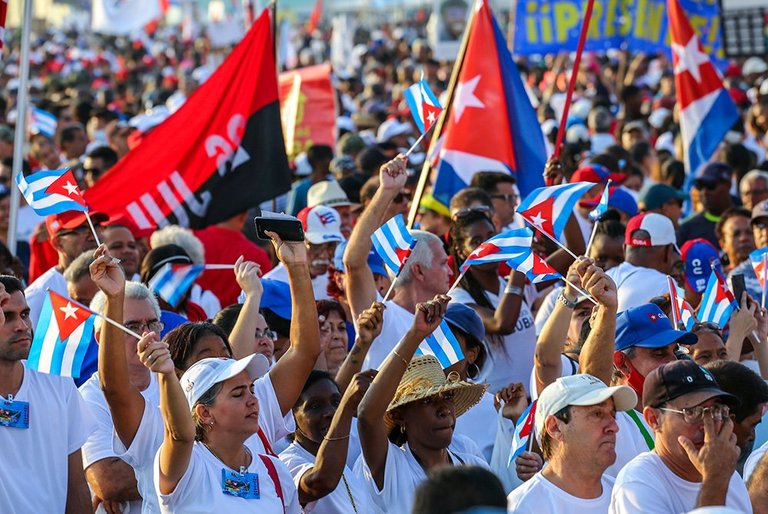 Source
SourceYour quick regional roundup
A policeman was killed in a shootout yesterday in Medellín, a Colombian city that is increasingly bouncing—for the worse—in the media, amidst reports of violence, extortion, and sexual exploitation of children. The gendarme was killed while confronting an assault on a building by seven armed men. "I deeply regret his death and condemn the circumstances in which he was killed. In the reaction to an attempted robbery at a residence in Laureles, he was mortally wounded", the mayor of the city, Federico Gutiérrez, wrote on his X account.
A division of the Tenth Brigade of the Colombian Army seized 2.7 tons of marijuana in a department bordering Venezuela, capturing four people who were guarding the stash in a house, and who "were carrying two shotguns without the respective safe-conducts". On Tuesday, Colombian coastguards had intercepted more than 2.5 tons of drugs, including cocaine and marijuana, transported in boats crewed by Ecuadorians, and distributed in similar quantities.
But it is in Paraguay where drug trafficking received the most convincing blow in recent hours, with the seizure of 45 tons of chopped marijuana in the Caazapá National Park. We recently commented here on the seizure of another important volume of drugs in Paraguay. In addition to the chopped drugs, the National Anti-Drug Secretariat destroyed 21 hectares dedicated to illegal marijuana plantations—which have a detrimental effect on the rich forest ecosystems—and 12 camps where the plant was processed, for a total of about 110 tons of cannabis taken out of circulation.
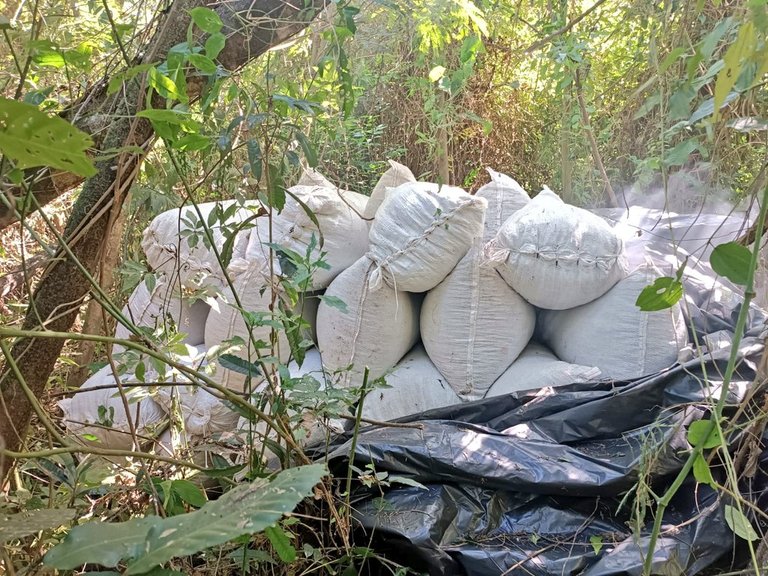 Marijuana seized in Paraguay (source).
Marijuana seized in Paraguay (source).And this is all for our report today. I have referenced the sources dynamically in the text, and remember you can learn how and where to follow the LATAM trail news by reading my work here. Have a nice day.


Posted Using InLeo Alpha